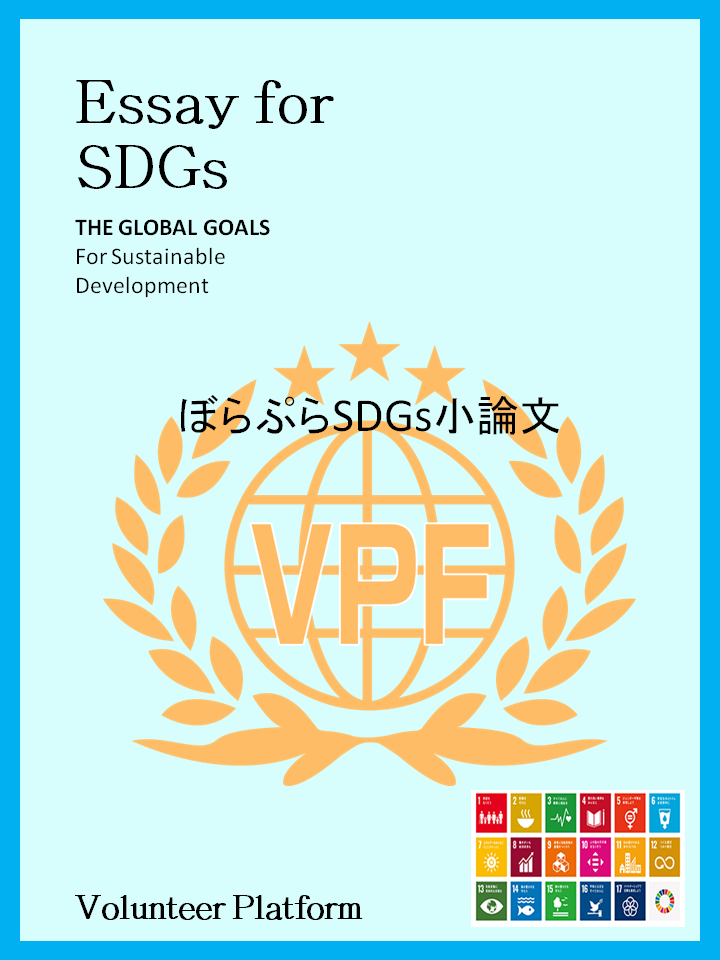[ぼらぷらSDGs小論文]

『Sustainable fashion』
プレゼン動画
プレゼン資料
※動画内のスライドが見にくい方は、こちらをご確認ください
小論文
『Sustainable fashion』
We wear clothes every day. Did you know that clothes is having a negative impact on people in other countries and on the environment? There are three main problems that the world faces with clothing: donation to developing countries, massive waste, and poor working conditions in developing countries. In order to solve these problems, I believe that not only individuals but also companies need to take concrete measures.
Firstly, donation to Africa. Municipalities, companies, and charitable organizations collect used clothes and donate them to poor people in Africa. I am sure many of you have heard of such activities. When I visited the Philippines as a volunteer, I also donated clothes I could no longer wear to children in slums. The children seemed very happy. At the same time that I witnessed the problem of poverty and the lack of clothing, I also felt the joy that fashion can bring. Of course, donations of clothes are helpful in areas where there is an extreme shortage of supplies, such as refugees. But, sending clothes does not necessarily help the local people. According to the BBC NEWS in the UK, 15 million pieces of used clothing are imported into Ghana every week. However, about 40% of these clothes are disposed of in landfills. Another problem is the lack of development of the local clothing industry due to donations from developed countries. The local clothing industry has been unable to become self-sufficient because of its dependence on the good-quality clothes sold for about 6 yen from developed countries. In addition, donations are sent irregularly. This will cause the problem of not being able to plan for production. In my opinion, the developed countries are simply sending their unused clothes in the name of donation. If they just want to incinerate them, they can do it in their own countries. If we are going to donate something, we need to respond to the needs of developing countries. Even if it is an act of good will, we need to know what the results are.
Secondly, there is the issue of mass waste: by 2020, more than 3 billion pieces of clothes were discarded in Japan. And about one-third of these clothes will have been thrown away when they were brand new. More than 90% of the discarded clothing is incinerated or landfilled, and data shows that 10% of carbon dioxide emissions come from the apparel industry. It exceeds emissions from international aviation and shipping.
Finally, there are the poor working conditions in emerging economies, as exemplified by the 2013 Rana Plaza tragedy in Bangladesh, in which a sewing factory collapsed. What does this accident have to do with apparel? It was due to the fact that the workers were put to work for long hours in a building that was not durable. Fast fashion are made in emerging countries where labor costs are low in order to lower costs. And in order to lower costs, many people are forced to work in sewing factories under conditions that seem to ignore human rights.
What can we do to solve these problems? We need to fulfill our responsibility to make and use clothes. As a concrete example, we believe that manufacturing companies should practice circular economy. By using waste as raw materials, it is possible to manufacture in a cyclical manner without waste. What we can do personally is to put clothes we no longer wear in collection boxes in stores, use outlets and flea market applications. Other ways include using them in place of cloths for sewing. We believe that doing so will help solve the problem. By fulfilling our responsibility to make and use clothes, we can prevent climate change, and people around the world will feel more fulfilled because there will be no inequality among people and nations. If we can eliminate the negative impact of clothing on other countries and the environment, and develop a sustainable apparel industry, people around the world will be able to enjoy fashion. I would like to contribute to the realization of a sustainable society through actions I can take.
発表会の様子

オンライン研修を受講した感想
総合的な満足度
普通

受講前の気持ち
SDGsについて学びたい、将来の進路に活かしたい、社会問題に興味がある
受講後の気持ち
SDGsについて行動したくなった!
研修を受講した理由を教えて下さい
SDGsについて興味があった上、英語での活動だから。
研修を受講した感想は?
SDGsについて事細かに学ぶことができたうえに、英語で学べたので、いい機会になりました。
今後、今回の経験をどのように活かしていきたいですか?
入試、面接、就職で活かしたい
これから受講される方へアドバイスお願いします!
英語版おすすめ!





 LINE相談
LINE相談
